Archives of Event of the Week
Literary Event of the Week: This Is How It Always Is paperback release reading at Seattle Public Library
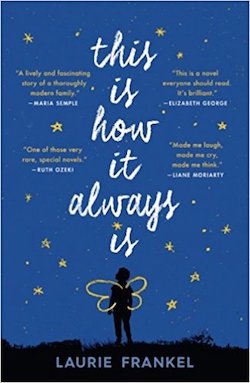
If that assessment is true—and I believe it is—Frankel’s novel, This Is How It Always Is, definitely belongs in paperback. This is a novel that should be discovered and read by a very wide audience—preferably one that has no idea what it’s getting into. Always is a novel about a family that must change and adapt when one of the children realizes she is transgender.
Unlike most American families in literature, the family in Always is supportive and kind and loving. They adapt to the change, mostly, with good humor and an abundance of love. This is a book that can change hearts and win over minds precisely because it’s so warm and friendly that it throbs empathy like a beating heart.
Tomorrow night at the downtown branch of the Seattle Public Library, Frankel debuts the paperback collection of Always to a warm hometown crowd. Frankel confided that the paperback edition was causing more than a little anxiety in her life, precisely because it is likely to be read by a wider, and more unsuspecting audience. She told me that the book had already inspired “a not insignificant amount of hate mail and death threats and that sort of thing,” and she expected the lower price point to draw out more of the same.
I suspect that a lot of that hate mail came from people who didn’t read Always; most of the haters likely read that the book was about a transgender child and responded with outrage. I also suspect that if most of those so-called defenders of decency actually bothered to read Always, they might likely find themselves won over to Frankel’s side. Always is a book about a mother’s love for her child, and even in these hyperpartisan times, that’s still a relatively uncontroversial subject. This is a book that will likely charm a lot of people who need to be charmed, and for that reason it’s a book that deserves to be in front of a much wider audience.
Seattle Public Library, 1000 4th Ave., 386-4636, http://spl.org, 7 pm, free.
Literary Event of the Week: Silence of our Friends reading at Elliott Bay Book Company
Jim Demonakos is best known in the city as a comic shop owner and the founder of the mighty Emerald City Comic Con. But since he’s sold the show to international convention promoter ReedPOP and stepped back from the organization, Demonakos has time to move to the other side of the comics industry — focusing on his work as a writer. Tonight at Elliott Bay, he celebrates one of his early works.
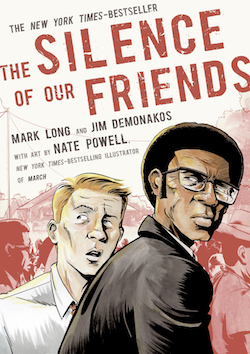
Co-authored with writer and video game designer Mark Long, Demonakos’s book The Silence of Our Friends, is named after a famous quote from Martin Luther King, Jr. (“In the End, we will remember not the words of our enemies, but the silence of our friends.") It’s a slightly fictionalized account of Long’s childhood in 1967 Texas, and it’s about the struggle of a white family — based on Long’s — and a Black family trying to free five young Black students who were unjustly taken into custody for the death of a cop.
Silence was originally published in 2012 by First Second, which has become one of the most consistently high-quality young adult comics presses in the business. It’s drawn by Nate Powell, who went on to illustrate Congressman John Lewis’s award-winning memoir comic about the civil rights movement, March.
Silence is being re-released this month by mass-market YA comics publisher Square Fish, and it couldn’t be revived at a better time. The points addressed in this book — of criminal justice reform, of the bland suburban face of white supremacy, of the importance of a free press and activism — are more relevant today than they were on the day the book was published.
Elliott Bay Book Company, 1521 10th Ave, 624-6600, http://elliottbaybook.com, 7 pm, free.
Your Week in Readings: The best literary events from January 8th - January 14th
Monday, January 8: African-American Writers' Alliance Poetry Reading
Members of Seattle’s own African-American Writers' Alliance share their poetry in a laid-back setting. Have you noticed that there are more readings happening in the south side of Seattle these days? Isn’t that great? Third Place Books Seward Park, 5041 Wilson Ave S, 474-2200, http://thirdplacebooks.com, 7 pm, free.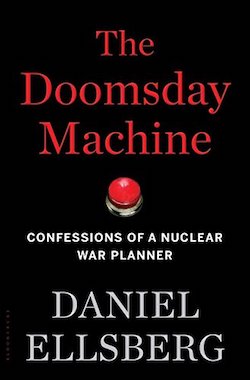
Tuesday, January 9: The Doomsday Machine Reading
Daniel Ellsberg is, flat-out, one of the greatest American heroes of the last hundred years. His bravery in exposing the Pentagon Papers should have earned him a monument in Washington DC, but perhaps he is just supposed to feel grateful for the fact that he hasn’t spent his entire adult life rotting in prison. In any case, Ellsberg is in town reading from his new book, The Doomsday Machine: Confessions of a Nuclear War Planner. Given that our president tweets unhinged things about our nuclear arsenal at weird hours of the day, this seems like an especially relevant book right now. University Temple, 1415 NE 43rd St,634-3400, http://www2.bookstore.washington.edu/, 7 pm, $5Wednesday, January 10: Castalia
The first 2018 edition of the UW creative writing reading series features poets Emma Aylor and Ainsley Kelly,as well as prose stylists Areej Maysarah Quraishi and Anca Szilagyi, along with faculty reader Maya Sonenberg. Hugo House, 1021 Columbia St., 322-7030, http://hugohouse.org., 7 pm, free.Thursday, January 11: The Immortalists Reading
Author Chloe Benjamin’s latest novel, The Immortalists, is about a mystical prophecy that foretells death. It’s a clever addition to the genre of fiction based around the primal thought experiment centered around what you would do if you knew the exact date and time of your death. Elliott Bay Book Company, 1521 10th Ave, 624-6600, http://elliottbaybook.com, 7 pm, free.Friday, January 12: The Days When Birds Came Back Reading
Oregon author Deborah Reed’s latest novel is about a writer who hires a carpenter to renovate and refresh her grandparents’ decaying home. It’s a book that deals with questions of trauma and guilt and the horrible things that members of families do to each other. Elliott Bay Book Company, 1521 10th Ave, 624-6600, http://elliottbaybook.com, 7 pm, free.Saturday, January 13: Two Countries: US Daughters and Sons of Immigrant Parents Reading
See our Event of the Week column for more details.
Elliott Bay Book Company, 1521 10th Ave, 624-6600, http://elliottbaybook.com, 7 pm, free.
Sunday, January 14: Writers Read
This event, which is co-sponsored by the African-American Writers’ Alliance, is a reading and open mic featuring fiction, poetry, and essays. Bring your latest writing and see how it lands on a crowd of real live people. Seattle Public Library, Columbia City Branch, 4721 Rainier Ave S, 386-1908, http://spl.org, 2 pm, free.Event of the Week: *Two Countries: US Daughters and Sons of Immigrant Parents* Reading
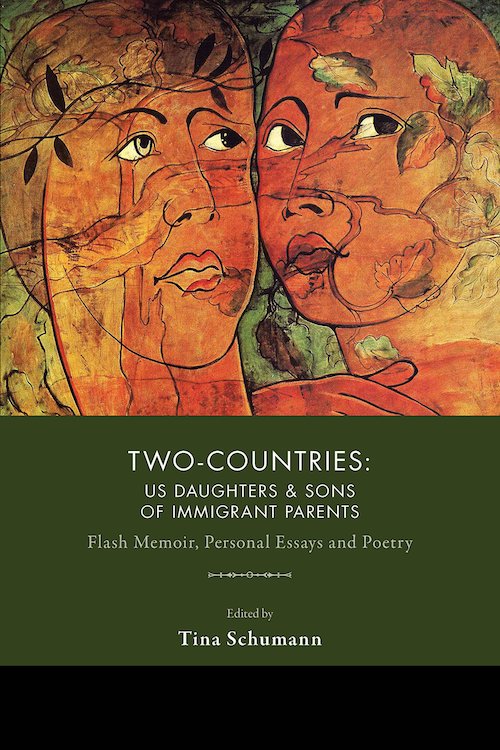
Certain Trumpy wall-o-philiacs seem to have forgotten that immigration is at the very heart of the American ideal. Those same alt-right douchebags have armed themselves with bushels of doctored statistics and phony stories to gin up a hearty phobia of immigrants in white Americans. Their goal is to foment fear in an effort to other immigrants, to build them into a monstrous “them” that “we” can then demonize and force out.
Of course, the single best way to combat these dingbats is to allow immigrants to tell their stories, to amplify those stories in any way we can, and to encourage environments where those stories are honored. Storytelling is how we turn “them” into “us” again.
Red Hen Press just released a book titled Two Countries: U.S. Daughters and Sons of Immigrant Parents — a collection of prose and poetry about the immigration experience from the perspective of second-generation Americans. Edited by poet Tina Schumann, the collection could not have arrived at a more perfect moment.
These are deeply personal stories, told with love and care. Dori Appel contributes a poem about the difference between her two sets of grandparents. One grandmother allowed her husband to leave her family and slowly build a life for them thousands of miles away; if the other grandfather had tried that, Appel writes…
my grandmother Sarah would have
gone after him in the wagon
and brought him home,
the way she did when they took him
or the Polish infantry.
These are the stories of families, each as unique as a heartbeat. Some came to America as refugees. Others came seeking opportunities. Others were more comfortable. But they all came, and they all love it here. As these stories illustrate — through comedy, through seriousness, through shockingly direct prose and through layers of metaphor in poems — they’re all as American as you or I.
This Saturday, January 13th, Schumann reads at Elliott Bay Book Company with Seattle poet (and recent Redmond Poet Laureate) Shin Yu Pai, who contributed to the volume a characteristically thoughtful account of visiting Taiwan with her aging father for "a reunion of the living." If your family, too, came to this rocky bit of nowhere in search of a better life, maybe you should go and share your story, too.
Elliott Bay Book Company, 1521 10th Ave, 624-6600, http://elliottbaybook.com, 7 pm, free.
Literary Event of the Week: Reading Through It Book Club at Third Place Books Seward Park
The second year of the post-Trump book club founded by the Seattle Review of Books and Seattle Weekly officially begins this Wednesday at Third Place Book Seward Park.
This month, for a change of pace, we're talking about something not specifically related to Trump, Russia, or the Republican Party. Instead, our choice, Cathy O'Neil's Weapons of Math Destruction, is about the rise of data and algorithmic systems. It's probably hard for you to place a priority on data management when the whole world is falling apart around you. But O'Neil argues that our faulty mechanisms of data management are exacerbating our problems.
Obviously, algorithms are responsible for the spread of "fake news" on Facebook, and the ability of Russians to interfere with the outcomes of the 2016 presidential election. But O'Neil points out that data can enhance pre-existing structures of racism and classism, creating a negative feedback loop that accidentally "proves" the problems that data collection is intended to solve.
This is important stuff, and it will be a big part of the conversation as we move toward the 2018 midterm elections. Weapons of Math Destruction is available for 20% off at Third Place Books right now, though no purchase is necessary to join us for the book club. I hope to see you there.
Literary Event of the Week: Garth Stein's Book Club

Tonight’s book club will discuss Brit Bennet’s debut novel, The Mothers. It’s about a young woman whose mother commits suicide. Shortly afterward, she discover that she’s pregnant. The Mothers is the story of cycles of heartbreak and loss and acceptance and all the shit that mothers hand down to their daughters, whether they intend to or not.
Because it’s a novel about Black protagonists, The Mothers might have been shelved in the “African-American Literature” section of a Borders, had it been released fifteen years ago. But the acclaim for this book is universal, and the themes are compelling to anyone who has ever been a part of a family. This is a book that succeeds on its own merits, one of those rare universally acclaimed novels that’s actually worth the hype.
Why not let Stein walk you through The Mothers and explain why the book works so well on so many levels? This is basically a master class in reading and writing, all for the low, low price of entirely free.
Third Place Books Seward Park, 5041 Wilson Ave S, 474-2200, http://thirdplacebooks.com, 7 pm, free.
Literary Event of the Week: Chlorophyll Print Exhibition
As the first Poet Laureate of the city of Redmond, Shin Yu Pai worked hard to bring poetry out into the civic space. She created a beautiful and elaborate combination of poetry and fabric art in response to a hate crime. She had another poem animated and projected onto the side of a building. She’s demonstrated new ways that poets can interact with the public.
Now Pai’s term as Redmond’s Laureate has come to an end, and one of her final public exhibitions is available for viewing through this week. Until December 21st, you can visit the Redmond Senior Center for an exhibition of a dozen chlorophyll prints that Pai created in collaboration with the artist Megan Bent.
As part of this project, Pai dug deep into the city of Redmond’s archives — “I must have sorted through thousands of images,” she says — to find photographs of city history. She selected images of Redmond woodcarver Dudley Carter, and of a bicycle festival that happened in Redmond annually for years, and of the city’s logging past. Then — using a more sophisticated version of the same technique she employed to grow words on apples in Carkeek Park — Pai then transferred those images onto leaves. The end result looked like this:

This is the second exhibition for the chlorophyll prints. Over the summer, Pai showed the leaves in specially designed light-safe boxes. They installed the boxes over the weekend, she tells me in a phone interview, and “we came back that following Friday for the opening, and it was real interesting — even in that short amount of time we noticed that some of the leaves had begun to shrink.” In fact, the leaves were changing in a multitude of ways: “there was browning, and there was subtle changes in color that were occurring,” Pai tells me.
Pai has worked with organic materials before, so she knows that some change is a part of the process. But she still tried to keep the leaves as lively as she could: “we tried to protect them from the light as much as possible. The degradation didn't happen as quickly as if they were in the sun that entire three-week period that the exhibition was up, but definitely they began to alter and change.” Because the physical leaves have degraded even further, the exhibit at the Senior Center, then, is made up of photographs of the leaves that had photographs burned into them. Pai admits with a laugh that this work represents “lots of layers” now.
It’s a dense project: a poet, recording a history of logging on the leaf of a tree that managed to not be cut down. It’s an attempt to preserve history on one of the most ephemeral objects in all of nature. (One of the easiest ways to mark the change of a season is to look at leaves.) And since the vast majority of all poetry in history has been written and published on wood pulp, you could also view the project as Pai’s attempt to forge a new truce between poets and trees. These poems don’t require the wholesale destruction of trees in order to live. They’re a new kind of collaboration between human and nature.
Redmond Senior Center, 8703 160th Ave NE., 425-556-2314, http://www.redmond.gov/cms/One.aspx?portalId=169&pageId=742, 8:30 am – 9 pm, free.
Literary Event of the Week: TheMystery.doc at Elliott Bay Book Company
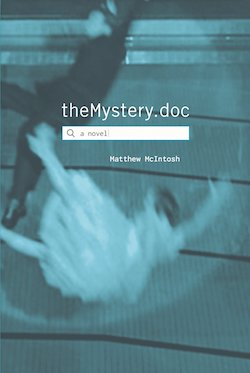
You’ll have to trust me when I say that theMystery.doc is surprisingly readable. You might groan when you pick it up and put it in your lap, but you’ll whip through it so quickly that page 100 will arrive before you even know it. And then the rest of the book comes tumbling after.
All of theMystery.doc’s pages are not loaded with text. There’s a lot of blank space, and photographs, and chunks of text broken up into long poems that require the reader to turn pages every few syllables. The rhythm of reading it is a staccato beat, with occasional pauses to refresh. The book simulates the act of trying to read a book in 2017: readers are continually “distracted” with text messages and digital alerts and bizarre images.
theMystery.doc is about a man who wakes up with no idea who he is. He doesn’t know the woman in his bed. He doesn’t know his neighbor’s name. He barely recognizes himself in the mirror. On his computer, there’s an empty document, titled "theMystery.doc." He tries to figure out his identity, and he attempts to unravel the mystery of theMystery.doc. More than just an amnesia thriller, it’s a story of a narrative trying to will itself to life.
This Thursday, McIntosh is making a rare public appearance in Seattle, at Elliott Bay Book Company. Much of the book is set in the greater Seattle area — in Federal Way; on a tour of the thrift stores of the north side, from the Lake City Value Village to the Deseret Industries on Aurora — and so this event has a special meaning to the author and the book. He’ll be showing a short film inspired by theMystery.doc, and then I’ll join him in conversation about his big, ambitious novel that is actively trying to eat the world. This should be a lot of fun.
Elliott Bay Book Company, 1521 10th Ave, 624-6600, http://elliottbaybook.com, 7 pm, free.
Literary Event of the Week: Poetry Across the Nations: An Indigenous Reading
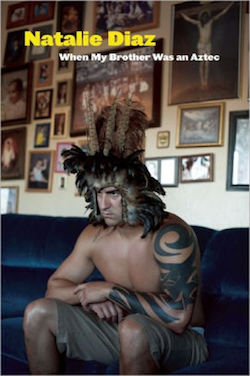
“The lives of Native women are not valued greatly in the Americas,” Arizona poet Natalie Diaz explains. This is not just a matter of feeling underappreciated; literal lives are at stake. “The rates of Native femicide in North and South America are astronomical, and also invisible in regard to mainstream media discussion.”
Part of the reason these lives are being snuffed out, Diaz says, is because Native women feel isolated and removed from the culture. “It is not often that we see positive and powerful representations and reflections of what is beautiful and strong and innovative about indigenous people, and especially indigenous women,” she writes in an email. With the help of the Hugo House and the Poetry Foundation, Diaz is working to celebrate Native women in the literary arts.
“I have been thinking a lot about the strong community of indigenous women artists and writers whose mentorship and friendship I have benefitted from greatly,” Diaz says. “I wanted to create a space where indigenous women's voices were regarded and value — to pay it forward in a way to some of the Elders whose work and friendships have made my own work possible.”
Now Diaz is ready to share that celebration with the world. It’s an ongoing program called Poetry Across the Nations, and it launches right here in Seattle in a multi-day celebration from December 6th to 8th. On Wednesday and Friday, Diaz will be hosting workshops for Native writers — find details at the Hugo House’s website — and on Thursday, December 7th, she’ll MC a reading of Native women poets at Fred Wildlife Refuge.
All are welcome at the Thursday night reading, which is free and will feature both Seattle readers and poets from across the country. The lineup is impressive: Celeste Adame, Laura Da’, Jennifer Foerster, Casandra Lopez, Sara Ortiz, and Cedar Sigo. Da’, Sigo, and Lopez have all been kicking ass at Seattle readings for quite some time; the three of them on a bill together should be practically lethal.
In the spring, Diaz will take Poetry Across the Nation on the road, with stops in South Dakota and Arizona already planned. But Seattle gets it first. If you’ve been outraged at the way Native voices have been silenced, ignored, and ridiculed by the Trump administration, here’s an opportunity for you to elevate and celebrate those voices. It’s up to all of us to witness Native women, to let them know that they’re seen, and welcomed, and appreciated.
Fred Wildlife Refuge, 128 Belmont Ave. E., 322-7030. http://www.hugohouse.org, 7:30 pm, free.
Literary Event of the Week: Artemis reading at Third Place Books
Andy Weir’s The Martian is a rare self-publishing success story. The Martian first began on a blog, in which Weir presented a series of problems relating to life on Mars followed with a cliffhanger, only to solve the cliffhanger in the next installment. And it must be said that The Martian is a ton of fun to read — basically, the dictionary definition of “page-turner.” Somehow, The Martian even defied the odds of adaptation, becoming a phenomenally watchable movie, too.
(Ask me to choose between the book and the film version of The Martian and I’d be hard-pressed to pick a side; while Weir’s original book contains a ton of nerdy detail that didn’t make it into the film, the film has Matt Damon at his most charismatic and a glowing ensemble cast. I love them both in different ways.)
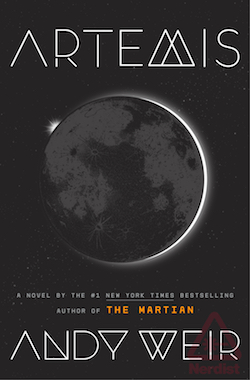
And now Andy Weir is back with his sophomore novel, Artemis and, well…let’s just say the sophomore slump is more than just a boogeyman. It’s not that Artemis is a terrible book, but it does pale in comparison to The Martian. It’s the sci-fi story of a heist on the moon, and it never really finds a comfortable cruising altitude. Artemis doesn’t enjoy the wheels-fall-off speed of The Martian; in fact at times it positively drags.
That said, Artemis is simply uneven; it’s not bad enough to make you reconsider the appeal of Weir’s first book (Ernest Cline’s Armada single-handedly kicked off the Ready Player One backlash, for instance; that doesn’t happen here.) And so far as sophomore slumps go, Artemis fulfills its purpose: it clears the decks, identifies Weir as a mortal who makes mistakes, and sets the stage for him to do whatever he damn well pleases with his third book. Without The Martian’s looming presence hanging over Weir, he’s finally free to do what he wants.
Even though Artemis is a disappointment, you’ll want to come out to the launch party for the book on Thursday November 30th at Third Place Books in Lake Forest Park. Weir will appear in conversation with Seattle’s own Neal Stephenson, and this is bound to be a conversation for the ages. Both writers are brainy, detail-oriented engineer types — Stephenson’s explosive novel Seveneves shares some DNA with The Martian — and they’re likely to blow your mind with the level of granular nerdy detail they’re willing to dig into. This conversation is absolutely the sci-fi nerd’s dream come true.
Third Place Books Lake Forest Park, 17171 Bothell Way NE, 366-3333, http://thirdplacebooks.com, 7 pm, $30.
Literary Event of the Week: The River Bank at Elliott Bay Book Company
Say you’re friends with a writer. Say one day your writer friend asks you to lunch. You ask what’s going on. She tells you, “I’m working on a book.” A book, you reply, that’s great! What’s it about?
“Well, here’s the thing,” she says. “I’m writing a sequel to The Wind in the Willows.”
Here’s where you’d gently try to convince your friend that she’s making a horrendous mistake, that the world doesn’t need a sequel to Kenneth Grahame’s beloved children’s classic. And just about any time, you’d be doing your writer friend a favor. But if your friend is Kij Johnson, you should just nod, tell her you look forward to reading it, and enjoy the rest of your lunch.
Johnson is one of the most important sci-fi writers in America today — one of the few names mentioned as a natural successor to Ursula K. Le Guin and a true standard-bearer of fantasy fiction. Her latest book, The River Bank expands on and explores the themes of Grahame’s novel with all the dignity and resourcefulness that the subject matter demands. (Johnson reads from The River Bank this Tuesday at Elliott Bay Book Company.)

As you’d expect from Johnson, River provides a feminist spin on Willows. The opening line identifies the most important change Johnson makes to Grahame’s mythos:
The news was everywhere on the River Bank and had been heard as far as the Wild Wood: Sunflower Cottage just above the weir had been taken by two female animals, and it was being set up for quite an extended stay.
It’s a divisive move:
The satisfaction felt by the feminine residents of the River Bank was not, alas, universal. A few days after the arrival of Beryl and the Rabbit, the Mole said to his friend, the Water Rat, “I do not see what all this fuss is about. We were going along very well without these two setting everything at sixes and sevens.”
Even the Rat, a confirmed bachelor, felt this was unjust. “Now, Mole, that’s not fair; you know it’s not. There was a lot of here-ing and there-ing at first, but now things are nearly as they were The young ladies keep to themselves. Why, we hardly see them!”
It’s like Twitter, with talking animals.
Fans of Willows will find much to appreciate here. Johnson appreciates the traditions — she writes a great, rampaging Toad — even as she builds on them. The animals of the River Bank, Weasel and Rabbit and Rat, all wrestle with big questions of change and tradition, and community. There’s a ransom plot, and a decent coshing. It’s all in good fun.
Johnson makes a bold inquiry into Willows’s class distinctions — it’s a story of upper-class men in a pristine rural land — and in so doing matures and expands the characters. She’s not burning down Grahame’s world, she’s engaging it in a deep and meaningful conversation, taking the characters by the hand and slowly introducing them to the modern day.
But even as she interacts with the world of Willows, Johnson never forgets to pay homage to Grahame’s gorgeous prose style — that deceptively lyrical language that lures children in and then grows and deepens with them as they age. Johnson is not intruding on alien land, here — she’s doing Grahame a boon by building on what came before.
Elliott Bay Book Company, 1521 10th Ave, 624-6600, http://elliottbaybook.com, 7 pm, free.
Literary Event of the Week: Pie and Whiskey at Washington Hall
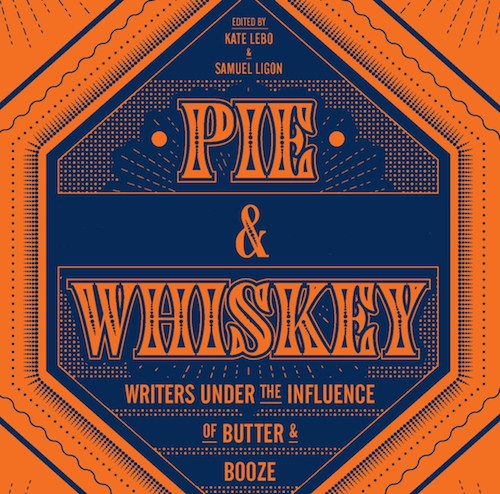
Pie and Whiskey is a popular reading series in Spokane and Missoula. Headlined by ex-Seattle author Kate Lebo and Sam Ligon, the series offers writers that most blessed of gifts: a theme.
Themes are a blessing, but some themes are too broad to work with, and others are too specific. Ask ten thousand writers to come up with stories about “war,” for instance, and you’ll get a spray of stories in response that will be impossible to categorize. But ask them to tell stories about the Battle of Thermopylae in particular and you’ll likely get too many stories that are way too similar.
But “pie and whiskey” falls right into the Goldilocks zone of themes. People love whiskey and people hate whiskey. Most right-thinking Americans love pie, but there are lots of different kinds of pie. The words evoke the idea of indulgence — likely, overindulgence —and warmth and togetherness. Pie is family, whiskey is friends. Both can go wrong.
Like any great anthology, the outliers in the new Pie & Whiskey collection are the chapters that grab your attention first. Shawn Vestal, for instance, writes a short piece about Frito Pie that stretches the definition of “pie” to its breaking point. But many of the very best pieces hew right to the heart of the theme: Gary Lilley’s poem “Meet Me in the Bottom” ends with a line that sums the entire anthology up in a handful of syllables: “I need to get the cold out of my bones.”
Standout contributors to Pie & Whiskey include Ed Skoog, Debra Magpie Earling, Margot Kahn, and Nicole Sheets. The book also contains some recipes for pie and cocktails; I haven’t tried any of them, but I have eaten Lebo’s pies before and I can attest to their extreme deliciousness. Lebo teaches pie-making classes, so if you follow the directions you’ll likely come away with something resembling a good pie.
This Wednesday, Town Hall will present a Pie & Whiskey reading at Washington Hall. Tickets are ten bucks, but that gets you a shot of whiskey. (This reading is for 21-and-over-types; I suspect that we teetotalers are pretty much screwed when it comes to discounts, though maybe you can will your entry shot over to a friend.) Readers include Ligon and Lebo, along with Tod Marshall, Elizabeth Colen, Robert Lashley, Jess Walter, Kristen Young, Lilley, and Vestal. Lashley, Lebo, and Walter are world-class readers. The other folks on the bill are pretty great, too. And even if half of the readers were having an off-night, there’s still likely to be plenty of carbs and booze onhand to keep you warm.
Washington Hall, 153 14th Ave, http://washingtonhall.org, 7 pm, $10, 21+.
Your Week in Readings: The best literary events from November 6th - November 12th
Monday, November 6th: Patty Schemel
Schemel is best-known for her years playing with Courtney Love’s band Hole. Her memoir Hit So Hard is about addiction and punk rock and what it’s like to play with a thousand different bands but to only get questions about the one with Courtney Love. Elliott Bay Book Company, 1521 10th Ave, 624-6600, http://elliottbaybook.com, 7 pm, free.Tuesday, November 7th: Cycling the Pacific Coast Reading
Bill Thorness is a Seattle author, but he gets around on his bicycle. In fact, he’s traveled the entire 2000-mile journey from Canada down to Mexico. His new book offers tips and tricks and itineraries for aspiring Pacific Coast bicyclists. If you’re not looking to travel the whole 2000-mile trek yourself, Thorness also offers shorter trips of a few days or weeks. Basically, the book covers any level of bicycling proficiency, from beginner to expert. University Book Store, 4326 University Way N.E., 634-3400, http://www2.bookstore.washington.edu/, 7 pm, free.Wednesday, November 8th: Chief Seattle and the Town That Took His Name Reading
See our Event of the Week column for more details. Seattle Public Library, 1000 4th Ave., 386-4636, http://spl.org, 7 pm, free.

Thursday, November 9th: Images of the West Reading
Down from Edmonds, photographer Randall Hodges shares photographs he has taken while wandering around the western portion of North America. Hodges will share tricks of the trade and explain why the west is his muse, and not the east. (Though that last one is pretty obvious to anyone who lives in Seattle: the west is dramatic and beautiful; the east is worn-down and exhausted.) Third Place Books Lake Forest Park, 17171 Bothell Way NE, 366-3333, http://thirdplacebooks.com, 7 pm, free.Friday, November 10th: Fresh Complaint Reading
Jeffrey Eugenides is a stone-cold genius writer of novels. If you haven’t read Middlesex, you’re missing one of the finest American novels of the last twenty years; you’ll likely be hooked from the very first description of a fire tearing along a waterfront. Tonight, Eugenides breaks a long silence with a short story collection titled Fresh Complaint. He appears in conversation with Mary Ann Gwinn, who is no longer the Seattle Times book editor but who is still one of the city’s foremost literary experts. Seattle First Baptist Church, 1111 Harvard Ave, 652-4255, http://www.elliottbaybook.com/, 7 pm, free.Saturday, November 11th: Open Studios 2017
Once a year, 1426 Studios, an art studio in the International District with three floors full of artists, opens up its space to anyone who wants to be a lookie-loo. This time around, they celebrate their annual event with a new storefront gallery. This is especially noteworthy because Seattle Review of Books columnist Clare Johnson will be showing work. Go and check out her stuff in person and tell her how much you enjoy her Post-It project.
1426 Studios, 1426 S Jackson St, http://www.1426studios.com/, 3 pm, free.
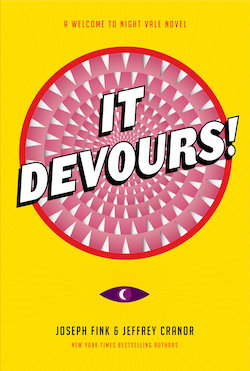
Sunday, November 12th: It Devours! Reading
Welcome to Night Vale is a podcast that revives some of the old-timey thrill of radio serials. Tonight, co-creator Joseph Fink will put on a little show to celebrate his latest Night Vale novel, It Devours!. This book, it must be said, has a FANTASTIC cover. University Temple, 1415 NE 43rd St,634-3400, http://www2.bookstore.washington.edu/, 7 pm, $21.99.Event of the Week: Chief Seattle and the Town that Took His Name reading at Seattle Public Library
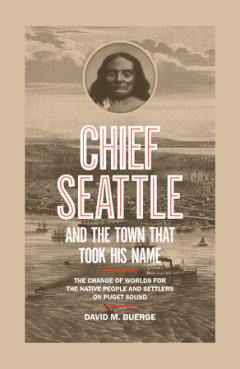
David M. Buerge’s Chief Seattle and the Town That Took His Name is billed as “the first thorough account of Chief Seattle and his times,” a “comprehensive story” of the colonization of Seattle that Buerge has supposedly been working on for two full decades.
So why has it taken so long to finally get the biography that Chief Seattle deserves? For one thing, many of the accounts are contradictory and passed down orally from generation to generation. For another, our writers have not always been interested in being fair-handed in their coverage of native history.
This is a book that tries to make peace of the many disparate accounts of this city’s namesake. Was he a common descendant of slaves, or was he a noble king? Which of the accounts of the founding of Seattle — if any — should we believe?
Buerge’s account tracks all the way back to the first flirtation of white America with the lands of the Pacific Northwest. Americans were drunk on the insanity of Andrew Jackson, and our nation’s bloodlust was reaching bold new heights. It’s a story of war and disease and dishonor and regret. In other words, it’s an American story.
On Wednesday, November 8th, Buerge will discuss his book with Duwamish Tribal Chair Cecile Hansen and Nile Thompson, a native languages expert, in a conversation moderated by Town Hall and Seattle Weekly founder David Brewster. The incorporation of Hansen and Thompson into the event is important; it would have been easy, twenty years ago, for Chief Seattle to be another Eurocentric story about the white men who "invented" the land on which we all live.
We expect more thoughtfulness and more inclusion from our history books now, and that’s as it should be. With this book Chief Seattle gets maybe his first shot at a full and fair examination of his legacy since the first white settlers showed up. That makes this a significant moment in Seattle history.
Seattle Public Library, 1000 4th Ave., 386-4636, http://spl.org, 7 pm, free.
Your Week in Readings: the best literary events from October 30th - November 5th
Monday, October 30: Leonardo Da Vinci Reading
Walter Isaacson has made a career out of writing about geniuses. He’s written books about Einstein, Steve Jobs, and Benjamin Franklin. His latest book is a biography of one of history’s most important geniuses: Leonardo Da Vinci. How does one man paint several of the most recognizable paintings of all time, make world-changing discoveries in anatomy and biology, and craft a flying machine in just one lifetime? Broadway Performance Hall, 1625 Broadway, 624-6600, http://elliottbaybook.com . $43. All ages. 6:30 p.m.Tuesday, October 31: Booktoberfest: Halloween Horror Hour
Seattle’s librarians are fucking awesome. They sing karaoke. They kick your ass at trivia. They recommend books and help you locate some obscure title you saw one time five years ago in Bora Bora and the only thing you know for sure is that the dust jacket was blue. And they also read you scary stories on Halloween when they could surely be at a party somewhere canoodling with someone dressed up as Sexy Regret. Go get scared by a library professional. They went to school for this. Third Place Books Seward Park, 5041 Wilson Ave S, 474-2200, http://thirdplacebooks.com. Free. All ages. 7 pm.Wednesday, November 1st: Reading Through It Book Club
The joint book club from the Seattle Review of Books and the Seattle Weekly continues with this month’s selection, White Rage: The Unspoken Truth of Our Racial Divide by Carol Anderson. The book was originally published as an editorial in 2014, so this is not some hastily slapped-together post-Trump book (looking at you, Noam Chomsky). Even if you didn’t buy your copy of the book at Third Place Books, you’re welcome to come for what should be a really enlightening discussion. Plus, you can bring drinks from the bar into the book club! Third Place Books Seward Park, 5041 Wilson Ave S, 474-2200, http://thirdplacebooks.com. Free. All ages. 7 p.m.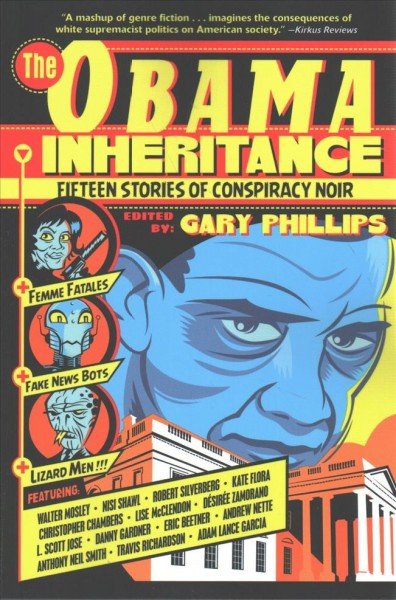
Thursday, November 2nd: The Obama Inheritance Reading
The Obama Inheritance is a new anthology of 15 stories which promises to transform noir into an “over-the-top, transcendental psychedelic thriller ride of pulpy goodness.” Every story in the book treats a far-right Republican conspiracy theory about Barack Obama as though it is true. Seattle sci-fi genius (and Seattle Review of Books columnist) Nisi Shawl will read from her contribution to the book. Third Place Books Ravenna, 6504 20th Ave NE, 525-2347 http://thirdplacebooks.com, 7 pm, free.Friday, November 3rd: Short Run Marathon Art Show & Pre-Festival Party
This weekend is all about the Short Run Comix and Art show, and tonight is the pre-funk. Short Run all-stars including Emil Ferris, Leela Corman, Julia Wertz, Jordan Crane, Gemma Correll, Tom Hart, nishat akhtar, Rebecca Artemisa, and Anders Nilsen will talk and cavort over refreshments. Several of the artists will share presentations of their work, too. Fantagraphics Bookstore & Gallery, 925 E. Pike St., 658-0110, http://fantagraphics.com/flog/bookstore, 6 pm, free.Saturday, November 4th: Short Run
See our Event of the Week column for more details.Sunday, November 5th: Two Short Run Events
This afternoon, Short Run cartoonists Nicole J. Georges and Julia Wertz will talk about their latest books with Seattle cartoonist ET Russian at the Seattle Public Library. Then, at night you should attend the launch party for free local cartooning newspaper Thick As Thieves, which will be taking place in the Mount Analogue space in the Pioneer Square art space X Y Z Gallery. Seattle Public Library, 1000 4th Ave., 386-4636, http://spl.org, 2 pm, free.
X Y Z Gallery, 300 S Washington St, http://www.mount-analogue.com/, 6 pm, free.
Literary Event of the Week: Short Run
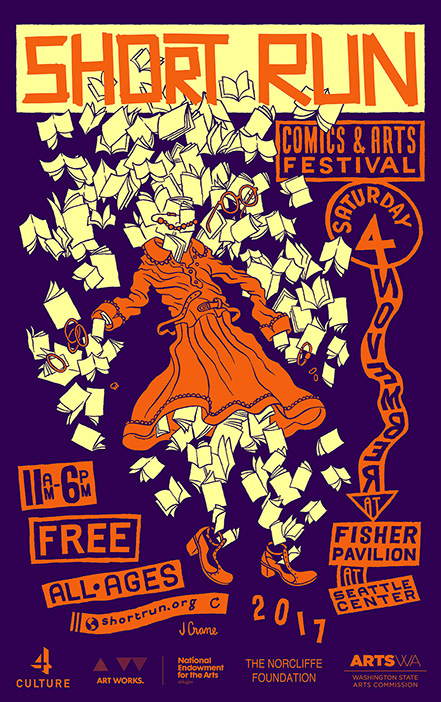
Every year, the Short Run Comix & Arts Festival gets a little larger. This year's happening at Seattle Center on Saturday, November 4th from 11 am to 6 pm, is way bigger than last year's mammoth show.
And this isn't some size queen trip: the additions are all high-quality affairs. The main floor of Short Run will be essentially the same: 270 exhibitors spread across the floor of Fisher Pavillion. These are cartoonists and publishers and poets and zine-makers and other graphic artists from around the country and the world, here in town to sell you something beautiful.
After the end of the APRIL Festival this year, Short Run made a point of reaching out to literary talents, to give them more of a voice at their show. One whole row of the show is now devoted to a "Lit Alley" of independent literary talents and presses. Authors Willie Fitzgerald, Emmett Montgomery, and Stacey Levine will also write short stories on the spot based on Twitter posts in something called the Reverse Tweet Translator.
And there's more, too: What's a convention with some panels? Across Seattle Center at the Vera Project, Short Run is throwing a days' worth of panel programming, including "an active participatory performance by Sean Christensen, Fern Wiley, Maura Campbell-Balkits, Vivian Hua, Eileen Chavez & Daria Tessler;" a conversation with cartoonists Emil Ferris (author of the brilliant My Favorite Thing is Monsters) and Leela Corman moderated by me; a discussion on comics journalism with Jesús Cossio, Joe Sacco, and Seattle's own Sarah Glidden; and a spotlight on Bitch Planet author Kelly Sue DeConnick.
Short Run's high-profile special guests will be running a few programs, too. Julia Wertz, author of the comics memoir Drinking at the Movies and the urban sketchbook Tenements, Towers, & Trash, will be teaching a class. So will minicomics legend Tom Hart. Cartoonist Anders Nilson has created a participatory coloring-book garden for the show. And as always, the Short Run Bake Sale will be shilling high-quality brownies to fill your belly after you walk around Seattle Center all morning long.
There's much more, including programming before and after the big day. You can consult our Your Week in Readings column for more details or just look it up on Short Run's own site. And check back here for more over the coming week. Every day here on the Seattle Review of Books we'll be running interviews with Short Run exhibitors and reviews of books that will be debuting at Short Run. No matter what your interests, you'll find something at Short Run that feels like it was made just for you.
Literary Event of the Week: Tara Atkinson at Vermillion
When Tara Atkinson lost her favorite bookstore, she decided to do something about it. After the ferociously independent Pilot Books closed down, Atkinson and her friends came together to create the APRIL (Authors, Publishers, and Readers of Independent Literature) Festival, which ran longer than Pilot Books and, arguably, made more of a mark on the city then the bookstore which inspired it.
Atkinson was not just a curator of the APRIL Festival's wildly entertaining events. She was also a participant in the first APRIL pub crawl. She played an interstitial role in the evening, reading a story about fast food burgers while sitting in a little red wagon being pulled down Pine Street in an effort to lead audiences from bar to bar. (At one point during the wagon reading, I turned to author Stacey Levine and confessed that I worried Atkinson was going to get hit by a car or that her driver would lose control of the wagon and that she might die in an accident. Levine considered this for a moment and replied, "I don't know, Paul. It takes a lot to kill a person.")
Atkinson's departure from APRIL — she wanted to work on her own writing — marked the beginning of the end of the festival. The events of APRIL required both Willie Fitzgerald's curatorial exuberance and Atkinson's deliberative eye.

But now Atkinson has turned that eye more seriously to writing, and her first book is in the world. I reviewed Boyfriends last week, calling it "distant and tinged with sadness," as well as "very broadly funny." It's the perfect way to introduce Atkinson as a writer into the world: an affordable e-book, about 40 pages long, with not a word askew.
And now it's time for a party. And as we've already established, Atkinson knows how to put on an event. On social media, Atkinson has been requesting that people send her photos of their boyfriends. She's planning to use those photos as part of her reading. I don't know exactly what Atkinson's scheme is, but she's earned our trust through years of APRIL events, and so I can't wait to see what happens.
Vermillion Art Gallery and Bar, 1508 11th Ave., 709-9797, http://vermillionseattle.com. Free. All ages. Oct. 26, 2017, 7 p.m.
Literary Event of the Week: The Cascadia Poetry Festival
The idea of Cascadia has occasionally been held aloft by people who represent questionable causes. White supremacists love the idea of a free Caucasian Cascadia, for instance, and there are a couple of loudmouth anarchists in the Seattle area who love to bore folks at parties with their improbable vision of a utopian lawless barter economy.
But cast your eyes away from the fringes and you’ll find something impressively durable in the concept of Cascadia. Seattle obviously has more in common culturally, environmentally, and politically with Vancouver, British Columbia than it does with, say, Salt Lake City. The idea of a bioregion that transcends government boundaries is one deserving of examination — particularly now, when huge Trumpy swaths of the rest of our country are unrecognizable to us.
This is why the Cascadia Poetry Festival is more important now than it ever has been. Running from Thursday, October 12th to Sunday the 15th in Tacoma, the festival, which is now in its fifth year, hosts what may be its highest-profile slate of authors yet. Nationally recognized poets Patricia Smith and CAConrad both headline events and host workshops for aspiring poets.
The festival looks back to the history of Cascadia with a “Tribute to Grunge” reading featuring poets like David Fewster who have lived in the area since the Singles era and a panel discussion on the life and legacy of criminally underrated Cascadian poet and novelist Richard Brautigan. (You might argue that Raymond Carver or Tom Robbins have done more to shape the region’s literature than Brautigan, but I’ll respectfully riposte your claims with dozens of poems by contemporary local writers ranging from Sarah Galvin to Sherman Alexie that feel like distant literary cousins of Brautigan’s.)
But the Cascadian Poetry Festival doesn’t exist just so it can stare backward. Most of the festival’s programming is forward-facing. Washington state Poet Laureate Tod Marshall, for instance, hosts a workshop to “explore some of the ways that poets have used a sense of ‘place’ to propel their poetics,” and then extrapolate those observations into the concept of “what a Cascadian Poetic might mean for each of our practices.”
Perhaps most importantly, on Saturday afternoon the festival will host a small press fair featuring a cornucopia of local poetry presses including Wave Books, Ravenna Press, entre ríos books, and Floating Bridge Press, along with literary magazines including PageBoy and Poetry NW. This is an opportunity for the poetry-minded to network and discuss what it means to be from and of a place.
Because this is much is true: we won’t be able to figure out what it means to be from Cascadia until poets put a name to what Cascadia is. Without poets to lead the way and define our ambitions, Cascadia is nothing but a plot of land.
Literary Event of the Week: Masha Gessen at Piggott Auditorium
Permit me a moment to entertain my own craven self-interest: Reading Through It, the book club co-sponsored by the Seattle Weekly and the Seattle Review of Books, is happening tonight at Third Place Books Seward Park. We meet at 7 pm, you can bring booze to the book club, and no purchase is necessary. We’ll be discussing Noam Chomsky’s book Requiem for the American Dream. Our Trump-era book club is still going strong, with dozens of folks coming out for last month’s event, but there’s always room for you.
Not every book we’ve featured at Reading Through It has been great — looking at you, Hillbilly Elegy — but one of the most successful discussions we’ve had was for New Yorker author Masha Gessen’s The Man Without a Face: The Unlikely Rise of Vladimir Putin. Gessen is an exemplary journalist who knows when to sit back and let the facts speak for themselves. When writing about the rise of Putin, she knows that no amount of fancy adjectives can outstrip the horrors committed by the man, so she simply reports in clear language and allows readers to color in the details of the ghastly assassinations and brutal intimidation tactics on their own.
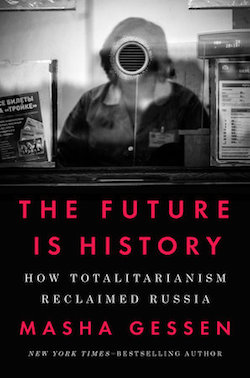
Now, Gessen is returning to Seattle at a special Sunday event, at 6 pm at Piggott Auditorium on Seattle University campus. She’s reading from her brand-new book The Future Is History: How Totalitarianism Reclaimed Russia. This book just might be the culmination of Gessen’s life’s work: a comprehensive and dense piece of reportage that details how the world’s other superpower collapsed after communism and then found a weird afterlife as a nasty mobster of a nation.
While it’s unlikely that Gessen included much — if anything — in the new book about Russia’s interference in the 2016 presidential election, it’s very likely that American readers will be able to make some inferences from History. In our book club, Man Without a Face heavily informed both our understanding of Donald Trump and our comprehension of how and why Russia might have gotten involved with our electoral process.
If you’ve been confused by all the talk about the so-called “Russia stuff” — the conversation about how Russia might have helped elect Donald Trump — this might be the most important book you’ll read all year.
Gessen is the best kind of non-fiction writer: she teaches her audience to be smarter. She doesn’t just jump to conclusions: she provides the evidence to her readers and allows them to make connections. And with this magnum opus of a book about the fall and rise of the world’s most misunderstood antagonist, it’s very likely that American audiences will soon learn more about Russia than they ever thought possible.
Event of the Week: Geek Girl Con at the Conference Center
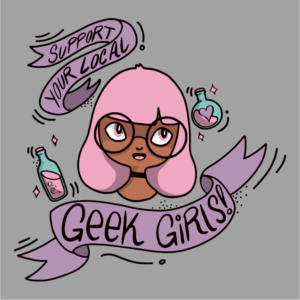
The design for this year's Geek Girl Con fundraising t-shirt by Celia Sutton.
I want to be clear: the idea of “reverse racism” is bunk. It’s made-up. It’s not real. Same with “reverse sexism.” The reason why is pretty clear: American culture has a default switch in its cultural and political systems, and that default switch is white and male. Even now, in 2017, most popular entertainment is directed toward a white male consumer; when women and/or people of color apply for positions ordinarily filled by a white male, they must endure ridicule, scorn, and outright hatred for daring to step up.
So racism and sexism is what happens when people who hold power — who occupy the default switch position — exercise that power on people who do not occupy the default switch. Racism and sexism is not just a personal action — you can’t employ racism and sexism unless you have the institutional and systemic power to back you up. So the news that some white and white male staffers quit independent Seattle convention GeekGirlCon earlier this year, citing reverse racism and sexism as the reason for their departure, fit a pattern that’s spreading through geek culture right now.
It is true that there has never been a better time to be a woman/LGBTQ/POC nerd. But that’s only because up until about a decade ago, nerddom was almost exclusively a white, male place. We’ve seen great strides in representation over the past decade: just about any comics bestseller list is loaded with books by populations who fifteen years ago would never have had the opportunity to publish comics. But the mediocre white dudes are striking back, whining that they have to share their comics shops with gross girls and other “SJWs” and engaging in targeted harassment campaigns on social media.
This is precisely why spaces like Geek Girl Con are so important. We’ve made tremendous strides forward in representation over the course of my lifetime, but regressive forces are actively trying to turn back the clock. Without spaces for nonwhite, non-straight, non-male nerds to network and geek out and discover new work and promote their own work, all that progress could be lost.
This year’s Geek Girl Con happens on Saturday and Sunday at The Conference Center on 8th and Pike Street downtown. Featured contributors include Seattle powerhouses like comics writer G. Willow Wilson and Maritess Zurbano (billed as “the only Filipina-American professional stage hypnotist in the world”) alongside nationally known videogaming figures like Lil Chen and Fryda Wolff.
You’ll also find hundreds of comics artists and novelists and assorted nerd personalities, including local institutions like Outsider Comics and Geek Boutique, Clarion West, and the University of Washington. And yes, straight white men are entirely welcome — so long as they’re okay with the fact that it’s not all about them, for once.